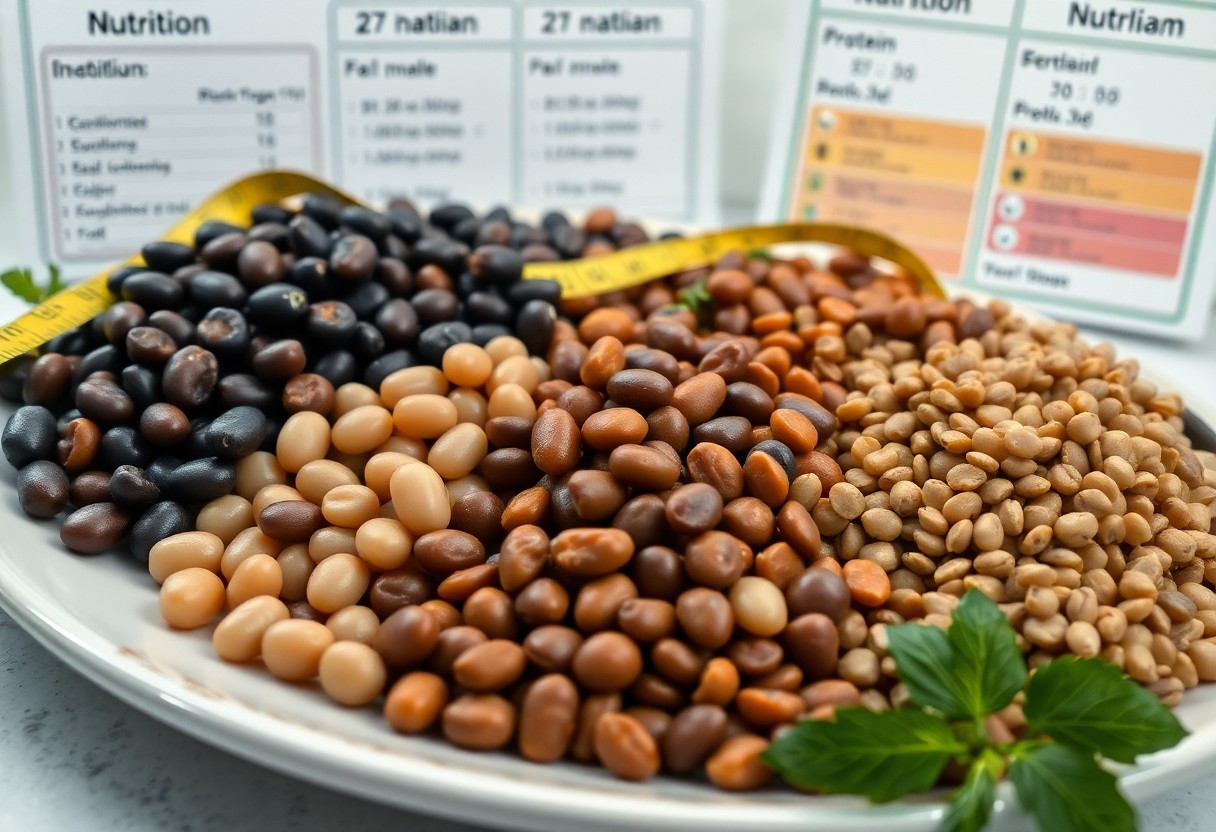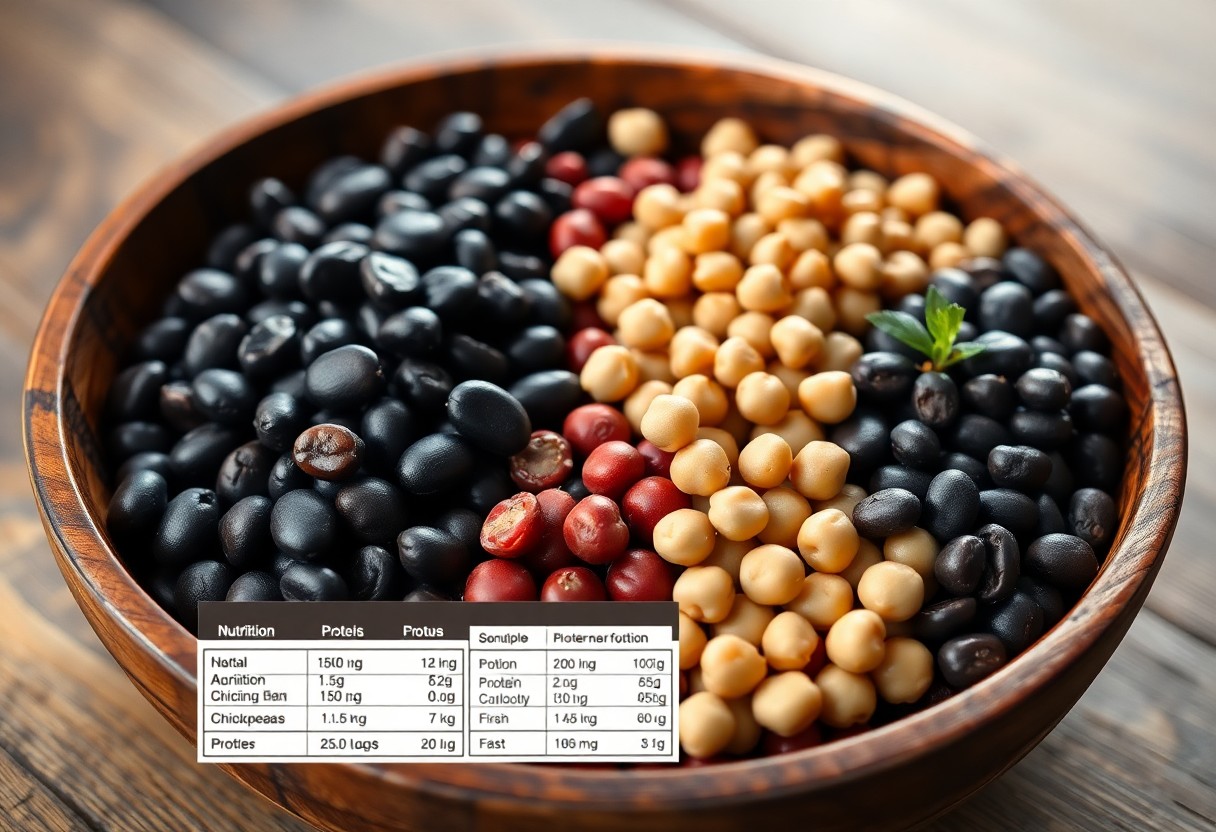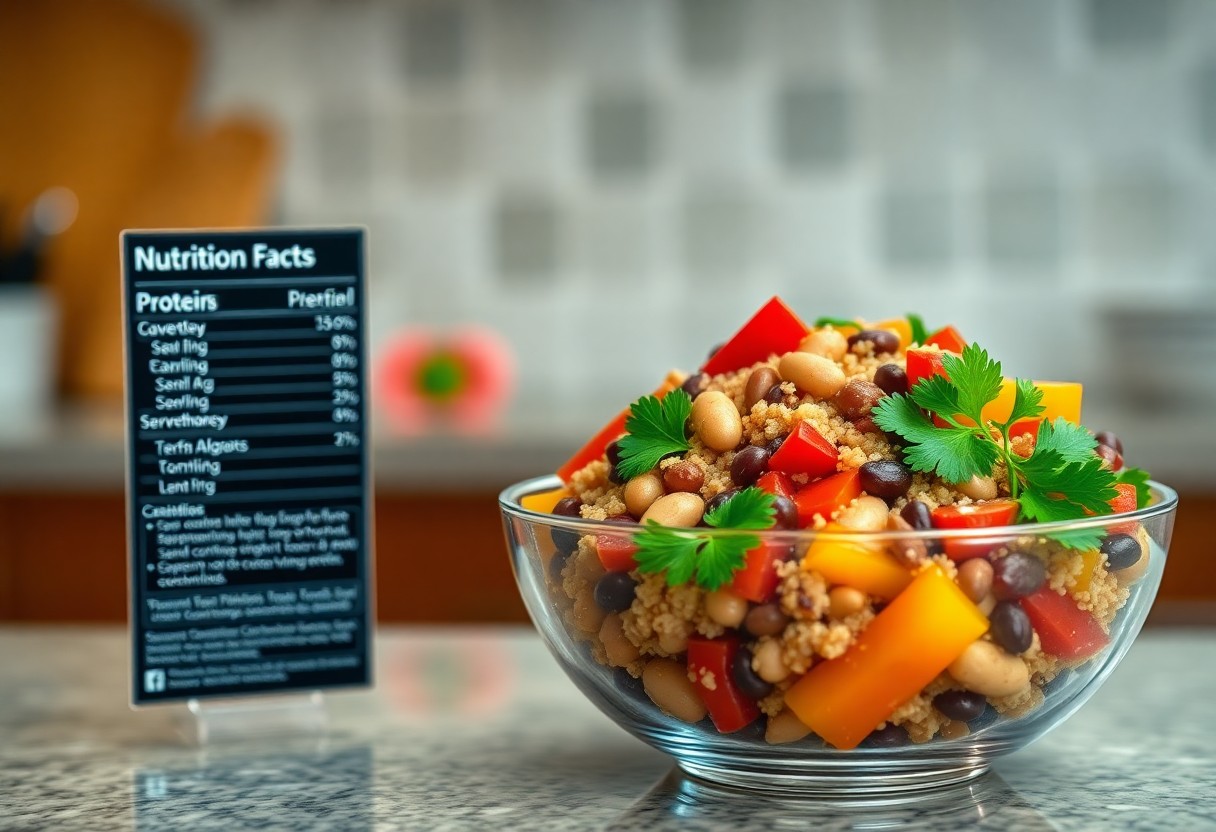You can enrich your diet with beans, a versatile and nutritious protein source. Packed with imperative amino acids, beans not only provide significant protein content but also offer a wealth of vitamins, minerals, and fiber that support overall health. By incorporating beans into your meals, you can enhance your protein intake while enjoying their numerous benefits, such as improved digestion and heart health. This blog post will explore the nutritional advantages of beans, helping you understand why they are an excellent addition to your diet.

Key Takeaways:
- Beans are a rich source of plant-based protein, providing imperative amino acids to support muscle health.
- They are high in fiber, promoting digestive health and aiding in weight management.
- Beans contain various vitamins and minerals, including iron, potassium, and folate, contributing to overall nutritional balance.
Nutritional Profile of Beans
The nutritional profile of beans varies among different types, but they are universally recognized as a powerhouse of nutrients. Typically, a one-cup serving contains about 15 grams of protein, 13 grams of fiber, and is low in fat. They also provide complex carbohydrates, making them an excellent energy source. This combination of nutrients not only supports muscle growth but also aids in digestion and helps regulate blood sugar levels, making beans an exemplary ingredient in a balanced diet.
Essential Amino Acids
Beans contain vital amino acids that your body cannot synthesize, making them a valuable protein source. While most beans, such as black beans and lentils, lack sufficient methionine, they compensate with high levels of lysine, another crucial amino acid. Pairing beans with grains like rice or corn creates a complete protein profile, ensuring you receive all the necessary amino acids your body requires for optimal health.
Vitamins and Minerals
Beans are packed with vital vitamins and minerals, contributing to various health benefits. They are particularly rich in folate, iron, magnesium, and potassium. Folate supports red blood cell production, while iron is vital for oxygen transport throughout your body. Magnesium is vital for muscle and nerve function, and potassium helps maintain proper fluid balance. This nutrient density not only promotes overall health but also supports vital bodily functions.
Specifically, one cup of boiled kidney beans provides about 13.1 milligrams of iron, which serves nearly 73% of your daily value. The folate content is significant as well, offering approximately 12% of your daily needs per serving. Magnesium contributes to muscle function, while potassium aids in maintaining healthy blood pressure levels. Consuming a variety of beans can enhance your intake of these vital nutrients, making them a cornerstone of a nutrient-rich diet.
Health Benefits of Bean Protein
Bean protein not only supports muscle health but also brings a wealth of nutritional benefits that can enhance your overall well-being. Rich in fiber, vitamins, and minerals, beans help regulate blood sugar levels, support digestive health, and provide long-lasting energy. For more details, explore The 9 Healthiest Beans and Legumes You Can Eat. Incorporating beans into your diet can be an effective strategy for maintaining a balanced, healthy nutrition plan.
Heart Health
Beans are heart-friendly due to their high fiber and antioxidant content, which can lower cholesterol levels and reduce the risk of heart disease. Studies have shown that regular consumption of beans significantly contributes to improved cardiovascular health, helping to maintain healthy blood pressure and promoting better circulation.
Weight Management
Due to their high protein and fiber content, beans can help you feel fuller for longer, making them an excellent addition for weight management. Their low-calorie density allows you to enjoy generous portions while consuming fewer calories overall. This factor helps curb overeating and satisfies cravings without compromising your dietary goals.
Incorporating beans into your meals can significantly support your weight management efforts. For instance, adding a cup of black beans to salads or wraps not only enhances flavor but also boosts your meal's nutritional profile. Studies indicate that individuals who include legumes like beans in their diet tend to have lower body weight and improved weight loss outcomes compared to those who do not. Their balance of complex carbohydrates and healthy proteins can stabilize your metabolism and fuel your body efficiently.

Varieties of Beans and Their Protein Content
Beans come in numerous varieties, each packed with its own unique protein profile and nutritional benefits. For instance, navy beans offer about 15 grams of protein per cooked cup, while kidney beans contain approximately 13 grams. Pinto beans, popular for their creamy texture, provide around 15 grams of protein as well. Understanding these differences helps you incorporate the right beans into your diet to meet your protein needs more effectively.
Black Beans
Black beans are not only rich in flavor but also provide about 15 grams of protein per cooked cup. Their high antioxidant content complements their protein, making them an excellent choice for boosting overall health. Incorporating black beans into your meals can enhance satiety while delivering necessary nutrients like fiber, iron, and magnesium.
Chickpeas
Chickpeas, also known as garbanzo beans, boast around 14.5 grams of protein per cooked cup. These legumes are versatile and can be used in various dishes— from hummus to salads. Their nutty flavor and firm texture make them a favorite among plant-based eaters.
Chickpeas are additionally high in fiber, which aids digestion and promotes feelings of fullness, making them ideal for weight management. The iron and folate content in chickpeas supports red blood cell production, further contributing to your overall health. Adding chickpeas to your diet not only enhances your protein intake but also enriches your meals with necessary nutrients, promoting better health and well-being.
Comparing Beans with Other Protein Sources
| Protein Source | Protein Content (per 100g) |
|---|---|
| Black Beans | 21g |
| Chicken Breast | 32g |
| Lentils | 26g |
| Tofu | 8g |
Animal Proteins
Animal proteins, such as chicken, beef, and fish, generally contain higher protein levels compared to beans, providing all vital amino acids needed for muscle repair. A 100g serving of chicken breast delivers about 32 grams of protein, significantly more than what you obtain from most beans.
Other Plant Proteins
Other plant-based proteins, including lentils and tofu, also contribute valuable protein levels, often containing higher amounts than beans. However, they may vary in amino acid profiles, with some lacking specific vital amino acids that beans provide. Plant proteins, such as quinoa and chia seeds, offer competitive protein levels, often exceeding that of beans. Though they may not be as rich in certain nutrients, combining them with beans creates a well-rounded protein source that includes all vital amino acids. Incorporating these diverse sources ensures you can enjoy a balanced diet while maximizing your protein intake.

How to Incorporate Beans into Your Diet
To enjoy the nutritional benefits of beans, aim to include them in your meals several times a week. You can add them to soups, salads, or casseroles, or simply mash them into spreads. For more insights on their versatility, check out Why beans are nature's perfect food.
Meal Ideas
Transform your meals by incorporating beans into various dishes. Consider a hearty chili with kidney beans, a Mediterranean salad with chickpeas, or a rice and black bean bowl topped with avocado. These options not only enhance flavor but also boost protein and fiber content.
Preparation Tips
To maximize flavor and nutrition, always rinse canned beans to reduce sodium. For dried beans, soak them overnight to shorten cooking time and improve digestibility. Cooking beans with spices or aromatics like garlic and onion can elevate their taste significantly.
- Rinse canned beans before use.
- Soak dried beans overnight.
- Cook with spices for enhanced flavor.
- Experiment with different bean varieties.
- This can create diverse meal options.
Investing some time in preparation can yield significant taste improvements. A slow cooker can be your friend for soups and stews, allowing flavors to meld beautifully over hours. Another tip is to cook a larger batch of beans and freeze portions for quick meals later on, making it easier to maintain variety in your diet without extra effort.
- Use a slow cooker for easy meals.
- Cook a large batch and freeze portions.
- Spices and herbs can change the profile of your dish.
- This ensures you always have beans on hand.
Common Myths About Beans and Protein
Several myths surround beans as a protein source, which can mislead individuals about their nutritional value. Many people believe beans lack protein or that they cannot fulfill your protein needs effectively. Others are concerned about their digestibility or assume that beans do not provide high-quality protein. Addressing these misconceptions is vital for understanding how beans can fit into a healthy diet.
Digestibility Concerns
Some people worry that beans may cause digestive issues or are hard to digest. While it's true that beans contain oligosaccharides, which can result in gas, soaking and cooking them properly can significantly reduce these compounds. By incorporating beans gradually into your diet and choosing well-cooked varieties, you can minimize digestive discomfort and enjoy their nutritional benefits.
Protein Quality Misconceptions
A common misconception is that beans are inferior protein sources due to their incomplete amino acid profile. While beans lack certain vital amino acids, they can be complemented by pairing with grains or nuts, resulting in a complete amino acid intake. Furthermore, beans provide valuable nutrients such as fiber, vitamins, and minerals, which enhance overall health and should be considered alongside protein quality.
Beans deliver vital amino acids, though they typically lack sufficient methionine. Pairing beans with whole grains, such as rice or quinoa, creates a complete protein profile. This combination not only addresses amino acid deficiencies but also enriches your meals with additional nutrients. For example, a rice and black bean dish offers a balance of proteins, fiber, and vital vitamins, maximizing both digestibility and nutritional value. Understanding how to combine foods effectively allows you to take full advantage of the protein quality beans provide while ensuring a well-rounded diet.
To wrap up
The nutritional benefits of protein in beans make them an excellent addition to your diet. You gain not only a rich source of plant-based protein but also imperative vitamins, minerals, and fiber that support overall health. Incorporating beans into your meals can enhance your protein intake while promoting heart health and aiding digestion. By choosing beans as your protein source, you are making a healthy and versatile choice for your dietary needs.
FAQ
Q: What are the nutritional benefits of protein found in beans?
A: Beans provide high-quality protein that includes crucial amino acids. They are low in fat, rich in fiber, vitamins, and minerals, contributing to heart health and digestive well-being.
Q: How do beans compare to animal protein sources?
A: Beans are lower in saturated fat and cholesterol-free compared to animal protein sources. They provide fiber, which supports digestive health, while also being a good source of plant-based protein suitable for vegetarians and vegans.
Q: Are all types of beans equally beneficial for protein intake?
A: While all beans contain protein, some varieties, like black beans, kidney beans, and lentils, are particularly high in protein content. It is beneficial to consume a variety for a well-rounded amino acid profile.
Q: How can beans be incorporated into a diet to optimize protein intake?
A: Beans can be added to salads, soups, stews, and sauces. They can also be used as a meat substitute in tacos, burgers, and wraps to enhance protein content and nutritional value.
Q: Are there any potential downsides to consuming beans for protein?
A: Some individuals may experience digestive discomfort due to the fiber content in beans. It is advisable to start with small portions and gradually increase intake to allow the digestive system to adjust.

0 Comments